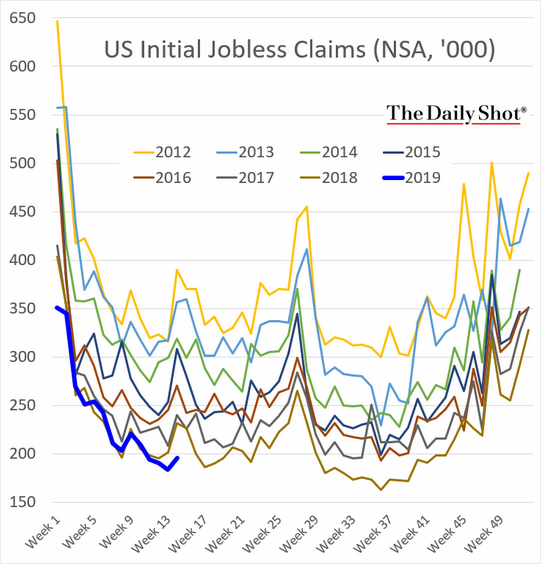Market Action
Global equities rose this week while the yield on the US 10-year Treasury note rose 6 basis points to 2.55% on signs of a stabilizing global economy. The price of a barrel of West Texas Intermediate Crude oil rose $1.50 to $64.15 amid supply disruptions in Libya. Volatility, as measured by the Chicago Board Options Exchange Volatility Index (VIX), fell to 12.50 from 13 a week ago.
Total bank lending in China rose a record 13.7% in the first quarter of 2019 as the government’s stimulus efforts begin to gain traction. Also welcome was a sharp rebound in export growth in March, though seasonal distortions caused by the Lunar New Year holiday continue to muddy the data. The general view is that the world’s second-largest economy is showing signs of stabilization after a sharp slowdown in 2018.
With a 12 April deadline looming, the European Council granted the United Kingdom a second, longer, extension of Article 50. That extension means Britain now has until 31 October to advance through Parliament the agreement negotiated with the European Union to withdraw from it. While Prime Minister Theresa May is aiming to complete that process in coming weeks, there is a very real possibility that the UK will be required to hold European Parliamentary elections in late May. The prime minister has been engaged in talks with the opposition Labour Party on the potential for keeping the UK in a customs union with the EU, which would result in a softer form of Brexit than had been envisioned earlier in the process, but she faces internal opposition from members of her own Conservative Party on that front.
Sudan’s President Omar al-Bashir was removed from power by the country’s military after months of anti-government protests against his three-decade rule. General Ahmed Ibn Auf announced the military will remain in control for at least two years to oversee a “transition of power”, to the dismay of protestors and outside observers hoping for a democratic government and swift action to address the country’s economic woes. Thousands who had been demonstrating against Mr. Bashir’s regime for the past four months stayed on the streets of the capital Khartoum overnight and into Friday, defying a curfew and calling for a civilian-led transition.
The International Monetary Fund lowered its outlook for global economic growth, trimming its forecast to 3.3%, down from a 3.5% view in January. Slowing growth in China, spillovers from the US- China trade conflict and tighter financial conditions contributed to the weakened global expansion, according to the latest World Economic Outlook from the IMF. Growth is expected to rebound in the second half of 2019 after a weak start, it reports.
Early legislative elections were held in Israel to elect the members of the twenty-first Knesset. A final count of ballots on Thursday gave Prime Minister Benjamin Netanyahu’s Likud party an additional seat in Parliament, making it the largest faction and punctuating the Israeli leader’s victory. Altogether, Likud and its traditional Jewish ultra-Orthodox and nationalist allies command a 65-55 majority, putting Mr. Netanyahu in position to head the next coalition government for a record fifth term in office (despite expectations that his own attorney general will indict him for alleged bribery and fraud). The elections had been due in November 2019, but were brought forward following a dispute between members of the ruling coalition government over a bill on national service for the ultra-Orthodox population.
British police dragged WikiLeaks founder Julian Assange out of Ecuador’s embassy on Thursday after his seven-year asylum was revoked, paving the way for his extradition to the United States for one of the biggest ever leaks of classified information.
Click here for this week’s updated market returns table.
What could affect markets in the days ahead?
US Treasury secretary Steven Mnuchin said this week that the United States and China have reached agreement on the enforcement mechanism of the trade agreement the two sides have been negotiating for months. Some details remain to be worked out, however, including the disposition of the existing tariffs regime. China would like tariffs ended immediately, but the US prefers to phase them out over time, so long as China remains in compliance with the agreement. Mnuchin offered no time table for a compressive deal but said he hoped it would be completed quickly.
General elections will be held in Indonesia on April 17. For the first time in Indonesian history, the president, the vice president, and members of the People’s Consultative Assembly (MPR), will be elected on the same day. It will be world’s biggest direct presidential elections (because the US uses an electoral college) and one of the most complicated single-day elections in global history.
Q1 earnings season has kicked off in earnest as of the end of this week, with analysts now forecasting a 4.5% year-over-year drop in S&P 500 Index earnings per share. That would be the first year-over-year decline in EPS in three years, says MFS global investment strategist Rob Almeida, also remarking that the tailwind from tax reforms undertaken at the end of 2017 has dissipated, margins are coming under pressure and the strength of the dollar remains a headwind.
Recommended Reads
BMW and Germany Face a Future of Electric Cars
Europe Isn’t Japan in the 1990s. You Should Still Be Worried – Bloomberg
Pacific islands: a new arena of rivalry between China and the US | Financial Times
Africa’s emerging economies to take the lead in consumer market growth
Why Xi Jinping’s China Model Is Causing Problems for Beijing
Norway Is Walking Away From Billions of Barrels of Oil – Bloomberg
Video of the Week
Tasting the World’s First Test-Tube Steak
Image of the Week
US initial unemployment claims are still at multi-year lows for this time of the year.

